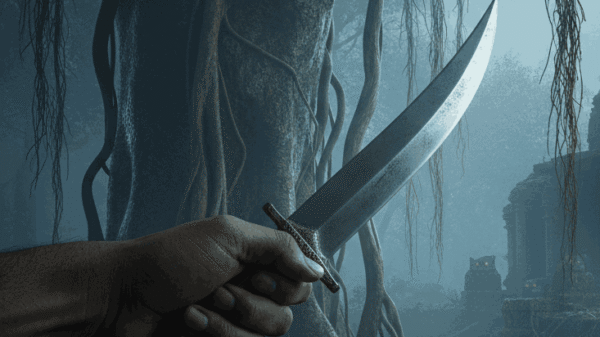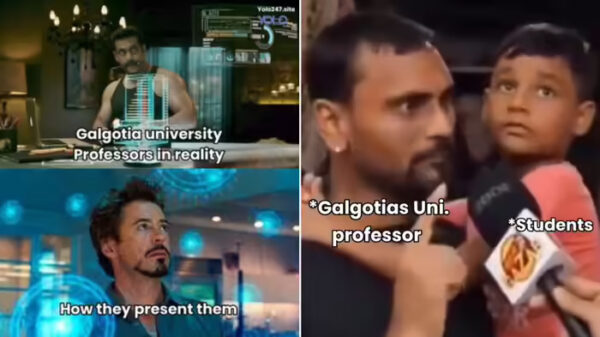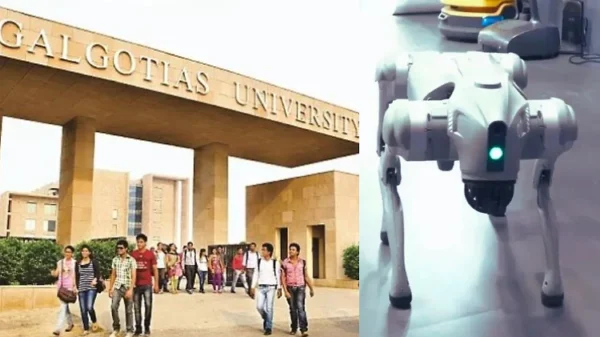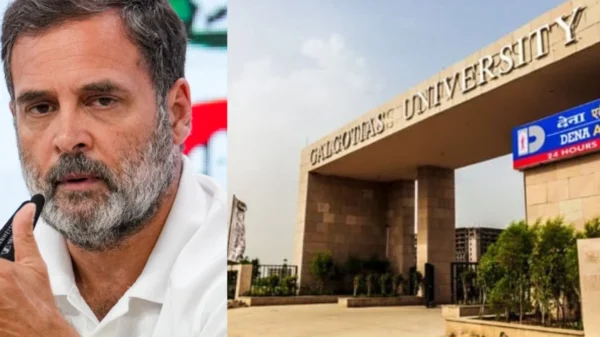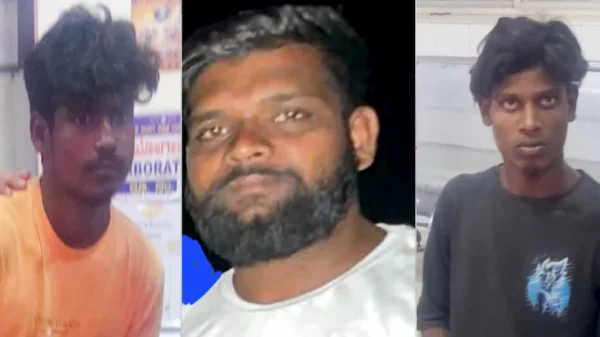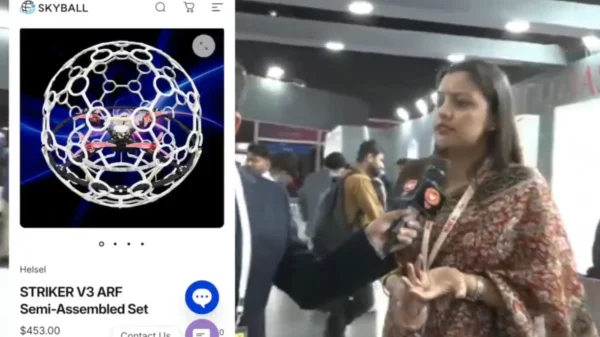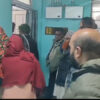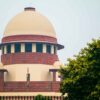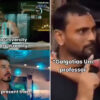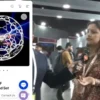As the Violence broke out in the early morning of November 24, Sambhal was plagued by reports of Police firings following a court-ordered survey of the Shahi Jama Masjid. Five people were killed in Police Shootings, while several others were Injured.
The Observer Post followed a case of two young boys, Hassan, aged 16, and Azeem, 17, both of whom were shot by police, and later accused in an FIR which we accessed.
Azeem and Hassan were hospitalized at Teerthanker Mahaveer Hospital (TMU) in Moradabad on the evening of November 26, requiring immediate surgery. However, after their case gained media attention, they were moved to an ICU and later taken to Moradabad Jail on December 2.
While still in the hospital, Azeem and Hassan, had both told the reporters what they faced. In one of the videos, Azeem was seen crying on camera as he divulged how the police pressured them to name at least 10 people. “They said that there’s only one chance for you to be saved. You have to name 10 people each”, Azeem said in the video. “I’m not even a local, how do I name 10 people”, he said.
When they asked the police what they needed to do, Azeem told reporters at the hospital that the police responded, “You will have to give a false statement, testifying that when we went to the place of the incident, both the police and the public were firing and pelting stones when we were targeted.”
On the other hand, Hassan told reporters, “I had gone to look for my younger brother. My father passed away, so I had come from Delhi for mandatory prayers. I got stuck in the crowd, and everything happened within minutes. A bullet hit my hand.”
After they spoke to the media and reports emerged about the 32 people initially arrested, Azeem and Hassan were allegedly shifted to the ICU. At the hospital, they were shackled to their beds, but following outrage on social media, the restraints were removed, and they were moved to the ICU to prevent them from meeting anyone.
A video circulating online showed those arrested wailing, their bodies smeared in blood—some had suffered bullet injuries, while others had been tortured at the Sambhal police station.
“Both boys were brutally beaten and forced to support the police’s version of events. At the police station, nearly 40 policemen took turns assaulting them and other detainees. While beating them, the officers pressured them to falsely implicate ten other people by naming them. The policemen also threatened that if anyone tried to resist, they would be shot, and their bodies would never be found. They even taunted them, saying, ‘You are Pakistanis—why don’t you go to Pakistan?'” Hassan’s mother, Muzahira, told The Observer post.
Four months after their injuries, they have yet to receive treatment, despite the Chief Judicial Magistrate ordering Hassan’s surgery on February 6 following an application filed by his lawyer.
Azeem and Hassan were remanded to judicial custody on the evening of November 24. They have been charged under Sections 191(2), 191(3), 190, 109(1), 125(a), 125(b), 121, 132, 121(1), 121(2), 324(4), 223(b), 326(f), and 317(3) of the Bharatiya Nyaya Sanhita (BNS), along with Section 7 of the Criminal Law (Amendment) Act, 1932, and Sections 3 and 4 of the Prevention of Damage to Public Property Act, 1984.
A Mother Grieves, a Father Remains Silent in Fear
In the early morning of November 24, Hassan had gone out looking for his younger brother, Hashim, who had gone to pray at his father’s Grave.
Irfan, Hassan’s Father, had suffered a heart-stroke on November 1, 2024 and passed away in an unfortunate circumstance. As a lone earning member of the family, Hassan moved to Delhi at the tender age of 15, working as a laborer at an LED bulb manufacturing facility in Paharganj.
Knowing about his father’s demise, he rushed home, and at the end of ten days of his father’s passing, he had gone back. “Who would have earned for the family if he stayed”, says his mother, Muzahira, while attempting to wipe her tears.
Hassan returned home on the 20th day of his passing, to facilitate the prayers. Then, he didn’t know that tragedy awaited him, as he was supposed to return to Delhi on the day when the Violence engulfed Sambhal, escalated by the Police shootings.
In the wee hours of November 24, the two brothers went to the mosque for the Fajr Prayers. Hashim, the younger of the two, went to the graveyard, as he was a hafiz and usually stayed back to recite Quraan at his father’s Grave.
His mother says that Hashim didn’t use a phone, and she didn’t know of his whereabouts until it was late. “There were people shouting, the crowd seemed to have settled right outside our street. It concerned me. I wondered whether it was Hashim who had become a part of the mob or there was some personal feud amongst the street boys”, Muzahira told The Observer post.
Afraid and worried about the prolonged absence of her younger son, she woke up Hassan, who had long been asleep after returning from the mosque, to go and look for Hashim.
“I didn’t know that the clash was taking place at Jama Masjid or anything, since the noise was too close to our home, I got concerned about Hashim, if he had gotten into a feud with someone. I asked Hassan to look for him,” she said.
She paused for a while, out of grief. “I don’t know what happened after that,” she said.
Muzahira had been on iddat, a necessary period in which muslim women observe solitude, for a period of 130 days in case of death of their spouse. The first time she met Hassan was in February since he suffered the injuries.
Hassan told his mother, during their meeting in Jail, that he was returning after looking for his brother. “On his way back, he felt dizzy and fell down. The last thing he saw was a policeman shoot at him from behind, and the bullet pierced through his hand,” Muzahira said.
When he was picked up, his left hand was broken by the police.
The family didn’t know where Hassan was until a video emerged in which he was seen in a cell. “My Khala (aunt) called and told me that Hassan had been hit by a bullet, at around 11 AM,” Aasiya, Hassan’s sister told The Observer Post.
When Aasiya, who lived a few places away, got to know and came home, she asked her mother where Hassan was. “She didn’t tell me that he was shot by a bullet, but said that he might have been hit with a pellet or something so that I don’t get afraid,” said Muzahira.
The whole day, Aasiya and Muzahira kept looking for him. They kept calling his number throughout the day, as it was not turned off. It was about 6 in the evening when a person picked the call and said that they were all in the police station.
“There were more than 30 people in the Kotwali—those who had been shot, those who were bleeding, and anyone the police could capture. They fired bullets, and whoever they could seize was taken to the Sambhal Kotwali and made an accused,” Muzahira said.
At around 07:00 PM, Aasiya dialled the phone again. This time, the person who answered told her that Hassan had already been taken to the hospital. “That’s when he said that the police had shot him in the right hand,” Aasiya said.
Alongwith Hassan, police had taken Azeem to the Sambhal District Hospital.
Khaleel, a laborer in Sambhal, was in distress upon hearing that his son, Azeem, had been shot. However, he was left in a state of uncertainty, unaware of his son’s whereabouts.
Azeem used to work in Panju Sarai, where he worked on silver leaves. A resident of village Shahbazpur, almost 25 Kilometres away from Sambhal, he had never been to Jama Masjid.
“On the day of the violence, my son was on his way to my cousin’s house, but he never made it there. Later, I found out he had been shot. I was in distress, searching for him everywhere. Eventually, I found him in the government hospital in the evening. But the police did not allow us to meet him,” Khalil told The Observer post.
Khaleel said that at the hospital Azeem told him that police were firing bullets. He was shot even before he had reached the Jama Masjid. Still hesitating to speak, Khaleel said that “The Police accused him since he told the media that he was being forced to give a false statement, to implicate and name around 10 people”.
He briefed the media about whatever he had faced by the police and the police later made him an accused.
“They put those people in Jail whom they shot, and if we say it, they’ll target us too,” Khalid said, still afraid to say anything.
“Both of them are in terrible condition. Their bodies are in pain. Azeem still has bullets lodged in his body. Yet, they are jailed instead of being given proper medical treatment,” Khalid told The Observer Post.
“They shot them first, then tortured them”
Early in the morning at 6 on November 25, Aasiya and her aunt went to see Hassan, but the police didn’t let them go inside the hospital. “When we pleaded with them to let us see my brother, they let us go in. Hassan was crying while draped inside a bedsheet. There was nothing but a wrap bandage around his hand,” she said.
“On the evening of November 26, Hassan and Azeem were taken to TMU. Hassan’s hand was still bleeding, and he cried out in pain. Despite doctors warning that his hand would be permanently damaged without immediate surgery, the police refused to allow it.”
Muzahira, who had met Hassan a day before I met her, said, “Hassan’s right hand, which was hit by a bullet, had thinned. The flesh in his hand is suspended by his fist. He cried seeing me.”
“I put a bedsheet in front of him, and asked him to try picking it up. He picked it up with other hand, as if I didn’t see him do it. Then, he tried to move his right hand, out of vain, and ended up hurting himself. They destroyed my son’s life.”
Aasiya said that the doctors told her that Hassan needed immediate surgery. “They warned that if the operation was not done, his arm would be permanently damaged. His nerves were severed and needed to be reconnected, or else he would lose the function of his hand. But suddenly, the doctors refused to proceed with the operation,” Aasiya said.
Hassan’s surgery was abruptly cancelled. “I could arrange the money somehow, he is my son. My son was kept hungry, without food or water, saying he will be operated on, but nothing happened,” said Muzahira.
Asiya recalled that the doctors had even prepared documents for Hassan’s operation and had taken her thumbprints on some of them. But later, the doctors said the surgery would not happen. At one point, they mentioned that the operation might take place in Delhi instead.
“When I asked the doctor why they didn’t perform the surgery, they said that there were orders from above to not do it. A doctor who was looking after Hassan said he would lose his job if he did anything,” Aasiya said.
The next day, Hassan and Azeem were secretly removed from the Hospital through the Backgate of the hospital. They were beaten again, while en route to the Moradabad Jail.
“On the evening of December 2, we wanted to see Azeem, but the hospital staff told us we would be called when the time came. But that never happened. Around 7:30 p.m., when I went inside, both boys were gone. I asked the doctors where they were, they said the police had taken them,” Khalil said.
As Aasiya contacted the police, she was told that Hassan was still in the hospital, but the said policeman didn’t pick her calls again.
The families of Hassan and Azeem had no information about their whereabouts, while the police “secretly removed” both of them from the hospital late in the evening. Their families searched for them all night but could not find them. “We were at the hospital gate, but he was not taken out from there. He was taken out through the back gate of the hospital,” Aasiya said. When they asked the doctors, they replied, “The police took the boys away.”
By around 12 p.m. on December 3, Aasiya learned that Hassan had been sent to Moradabad Jail. She visited him at the jail and, in tears, said, “I met my brother at Moradabad Jail around 1:30 p.m. He was not well. His arms weren’t functioning. Both of his hands were bandaged, and he was in great pain. He couldn’t even eat properly.”
During their meeting, Hassan told her that at around 7:30 p.m. the previous evening, he and Azeem were taken out of the hospital through the back gate and first brought to Sambhal Kotwali police station. Then, around 2:30 a.m., they were taken to Moradabad Jail.
Similarly, Azeem’s father, Khalil Ahmed, only found out on the afternoon of December 3—that his son had been sent to jail. He, too, had spent the entire night searching for Azeem.
“He was abused incessantly, they kept calling him a Pakistani, saying we’ll send you to Pakistan, where you’ll rot while en route to the jail,” he said.
The medical reports accessed by The Observer Post confirm that both Azeem and Hassan sustained severe injuries. Azeem had a bullet lodged just above his thigh, along with injuries to his chest, fingers, and spine. Hassan’s medical examination report from the District Hospital in Sambhal confirms a bullet wound on his right arm and fractures in his left.
With the lower court denying them bail, they remain incarcerated in Moradabad Jail without receiving the necessary medical care.
(Syed Affan is a writer and Journalist based in Delhi. His reportage focuses on Human rights, land conflicts, and policy)







